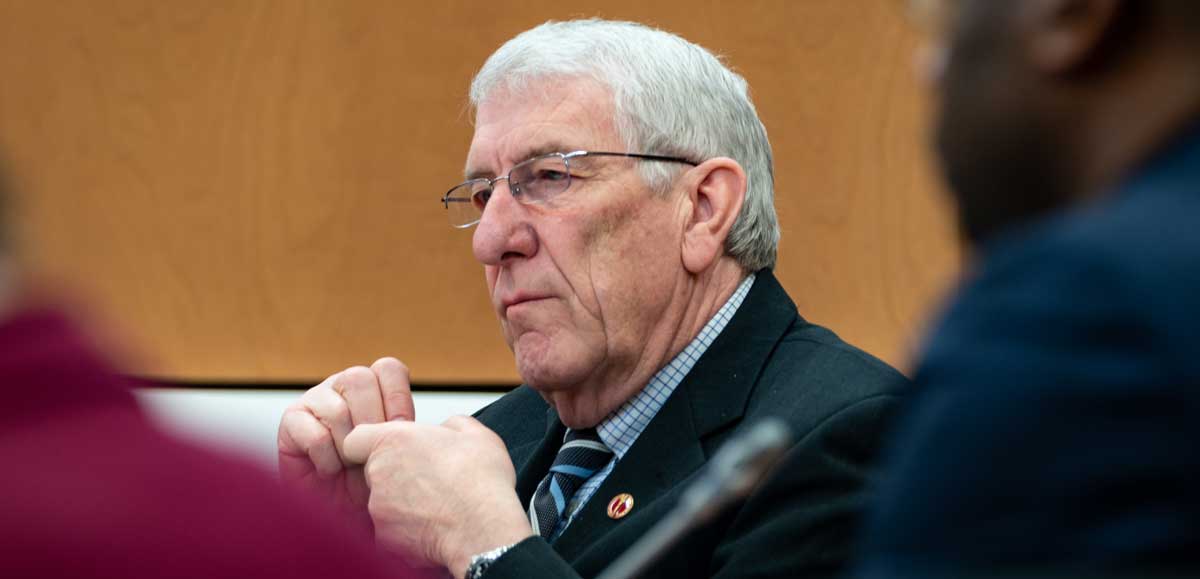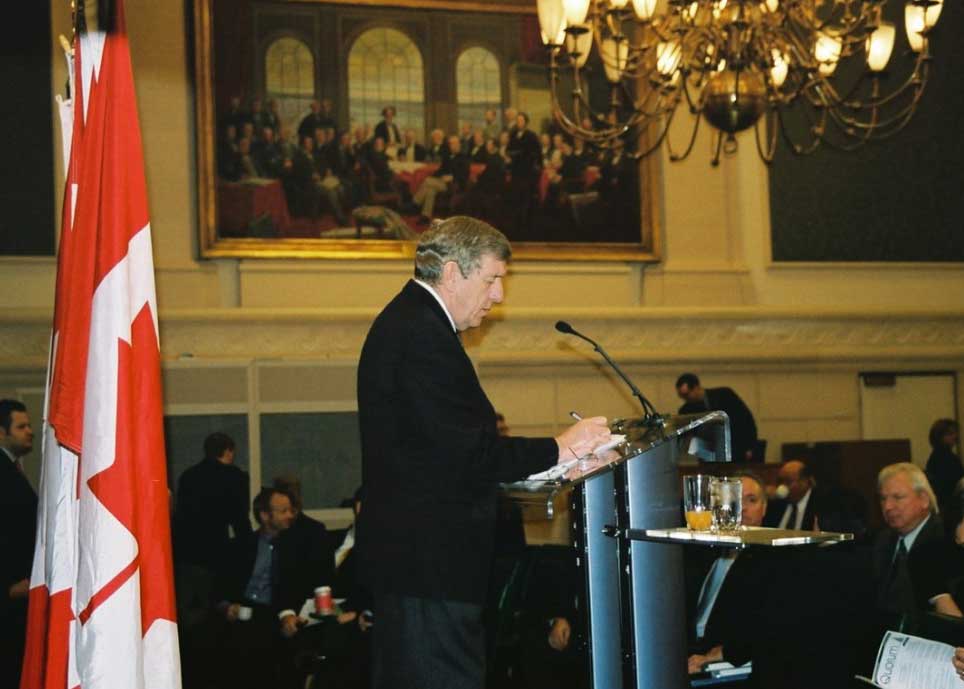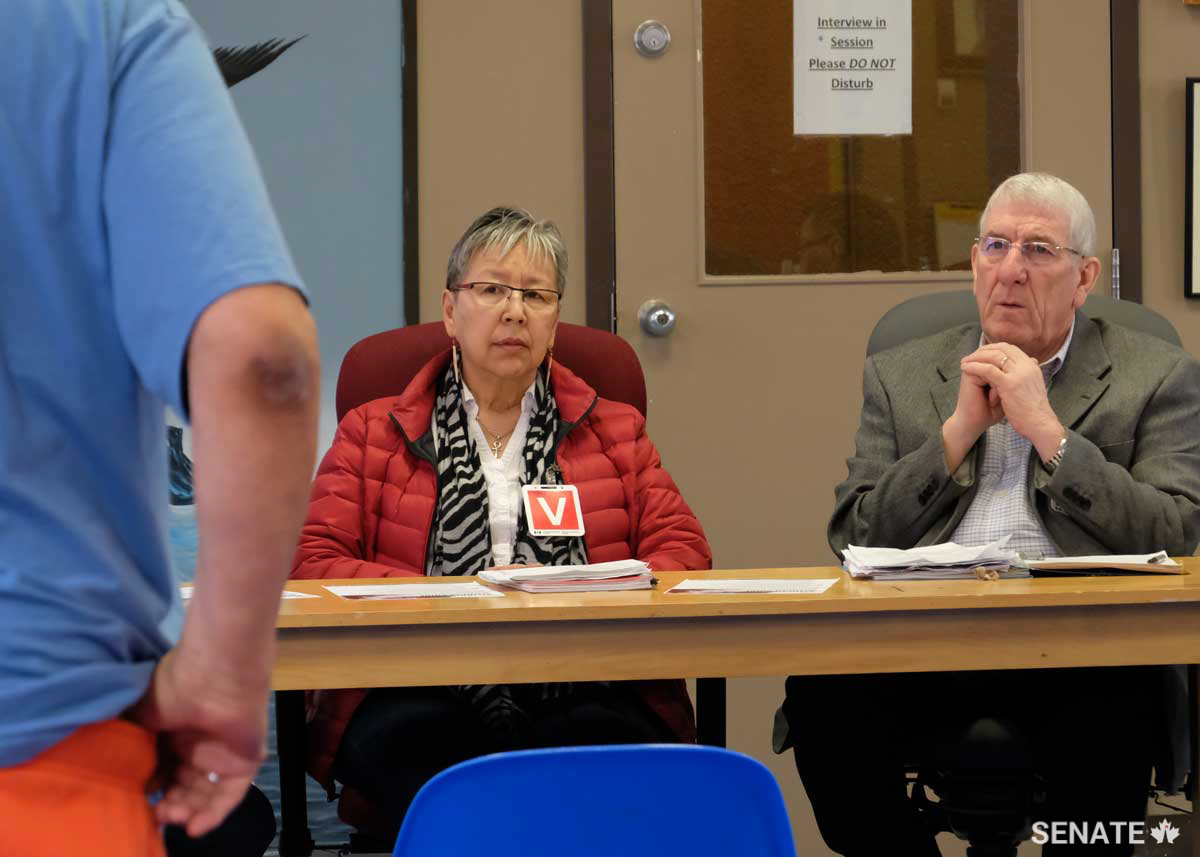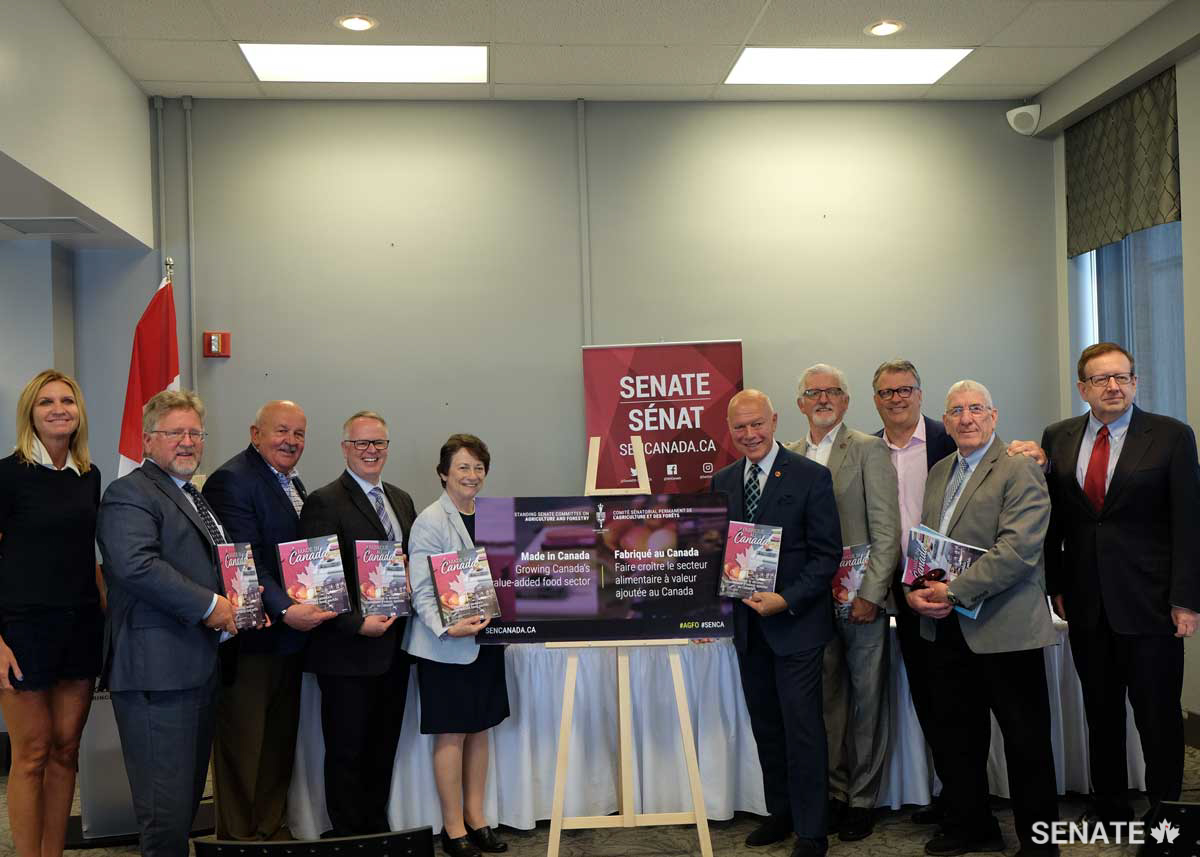‘Just like a flash, it’s over’: Senator Doyle reflects on 35 years of public service

Following stints as an iron worker on construction jobs that took him to the top of the World Trade Center towers, Senator Norman E. Doyle became grounded in political life in his native Newfoundland and Labrador. He spent 14 years in provincial politics before becoming an MP in 1997.
Appointed to the Senate on January 6, 2012, Senator Doyle served as a member of the Senate Committee on Aboriginal Peoples and the Senate Committee on Agriculture and Forestry. Ahead of his retirement in November 2020, SenCAplus asked him to reflect on his eight years in the Upper Chamber.

You went from working as an iron worker in Newfoundland and Labrador — and even on the World Trade Center in New York City — to being elected to the House of Assembly in Newfoundland and Labrador in 1979. What made you want to get into politics?
I was 25 when I left Newfoundland and Labrador to work on the World Trade Center as an iron worker. My brothers, Jack and George, were foremen on the Trade Center. When I arrived to work there, I think it was on the 35th floor. I stayed there until it was finished and then landed a job when the Come By Chance oil refinery was being built.
When I was growing up, everyone was talking about politics and it rubbed off on me. I decided I wanted to be more active. I started supporting our Progressive Conservative candidate. I was interested in talking about politics, putting up signs for Bill Doody and later I started giving him a hand. Coincidentally, he became a senator and I became his successor representing his provincial district of Harbour Main-Bell Island. I spent 14 years representing that seat provincially.
You were appointed to the Senate in 2012 after 26 years in provincial and federal politics. What was your reaction when you got the phone call from former prime minister Stephen Harper summoning you to the Senate?
Needless to say, I was very pleased. After being on the outside for even just a few months, I started to regret having left; at that point I had won eight elections back-to-back.
On a trip to Ottawa, I went to the House of Commons to have a chat after Question Period in 2011 with the old crew. Former prime minister Stephen Harper was there and he asked me up to his office to have a chat. To be honest, it was I who approached him for a shot at the Senate. I felt a little funny doing that. Later in December he called me and it was a good feeling to be back again. I felt good and a little bit proud that I had made it to all three houses with no defeat.

How did your previous career prepare you for your role as a senator?
My experience in the House of Commons was a great training ground for my venture into the Red Chamber. I did note, though, that the Senate was a little tamer with less yelling. You’re going from a house of about 300 members to a chamber of about 105 senators.
Having spent almost 12 years in the House of Commons and having been chair of the immigration committee for a few years, I knew the committee system. I actually think the Senate committee system is somewhat better than the House of Commons committees that I had been on and chaired. In the Senate, we had more time at the committee level to do a detailed job on any given bill, whereas in the House committees we were always in a hurry to get it back to the House again so that it could go to third reading and receive Royal Assent. In the Senate, we could be a little more detailed and we could also be less political.
Speaking of committees, you spent much of your career on the Senate Committee on Agriculture and Forestry as well as the Aboriginal Peoples committee. Why was that work important to you?
The issues on the Aboriginal Peoples committee were intense, such as the relationship between Indigenous peoples and Canada. A lot of problems had to be looked at on that committee, such as the problems of youth and family, preserving the language and the treaties Indigenous peoples had.
It was an emotionally draining committee. Sometimes you felt their pain when you saw witnesses break down and cry about their problems. I felt I was learning a lot about Indigenous people and how forging a new relationship with Indigenous communities was so important.
I’m also quite proud of the work we did on the Senate Committee on Agriculture and Forestry Committee. We delivered a great report called Made in Canada: Growing Canada’s Value-Added Food Sector, which, in part, looked at how we can be more competitive. When you look at the Netherlands, for example, they use 34 times less agricultural land than we have here in Canada, yet they process twice as much food as we do. It was such an interesting committee to be on.

You’ve been described as a diligent and active member of the Red Chamber. What will you miss most about the Senate?
I’ll miss the family that make up the Senate caucus. You really develop great friendships and just like a flash, it’s over. You may or may not see them again. The security people, the cafeteria workers, the custodians — you get to meet all of them and talk to them about their families. My assistant Jeanette Downey, a former Newfoundlander who has lived in Ottawa for 36 years and has worked on the Hill for 25 years, was my right arm and ran the office well. I will miss seeing her but plan to stay in touch. I’m going to miss all of them.
What advice would you give to newly appointed senators?
Don’t take on too many committees until you get to know the environment and how difficult your agenda can be at times. You do have a very intense and full day’s work to put in. If you take on too much, it becomes frustrating. I would also add, treat everyone the way they should be treated, with dignity and respect.
By the time you were summoned to the Senate, you said you had felt like a “fish out of water” when you were retired from federal politics for three years. Will this time be different? What are you looking forward to in your retirement?
I think it will be less of a shock to leave politics now. Who knows what’s coming in the future? It’s time now to sit back for a while and thank God for the great life and great opportunities that were given to me to serve for these 35 years of public life. I will also get to spend more time, instead of just weekends, with my wife, Belle, who has been not only my wife but my campaign manager for eight elections and my greatest supporter for the last 52 years.
I’ll spend a few weeks thinking of what my retirement will look like, but I will probably get into doing some volunteer work to begin with.
I have two wonderful grandchildren, Thomas, 12, and Will, 11, and they can keep me quite busy.

Related articles
Tags
Committee news
‘Just like a flash, it’s over’: Senator Doyle reflects on 35 years of public service

Following stints as an iron worker on construction jobs that took him to the top of the World Trade Center towers, Senator Norman E. Doyle became grounded in political life in his native Newfoundland and Labrador. He spent 14 years in provincial politics before becoming an MP in 1997.
Appointed to the Senate on January 6, 2012, Senator Doyle served as a member of the Senate Committee on Aboriginal Peoples and the Senate Committee on Agriculture and Forestry. Ahead of his retirement in November 2020, SenCAplus asked him to reflect on his eight years in the Upper Chamber.

You went from working as an iron worker in Newfoundland and Labrador — and even on the World Trade Center in New York City — to being elected to the House of Assembly in Newfoundland and Labrador in 1979. What made you want to get into politics?
I was 25 when I left Newfoundland and Labrador to work on the World Trade Center as an iron worker. My brothers, Jack and George, were foremen on the Trade Center. When I arrived to work there, I think it was on the 35th floor. I stayed there until it was finished and then landed a job when the Come By Chance oil refinery was being built.
When I was growing up, everyone was talking about politics and it rubbed off on me. I decided I wanted to be more active. I started supporting our Progressive Conservative candidate. I was interested in talking about politics, putting up signs for Bill Doody and later I started giving him a hand. Coincidentally, he became a senator and I became his successor representing his provincial district of Harbour Main-Bell Island. I spent 14 years representing that seat provincially.
You were appointed to the Senate in 2012 after 26 years in provincial and federal politics. What was your reaction when you got the phone call from former prime minister Stephen Harper summoning you to the Senate?
Needless to say, I was very pleased. After being on the outside for even just a few months, I started to regret having left; at that point I had won eight elections back-to-back.
On a trip to Ottawa, I went to the House of Commons to have a chat after Question Period in 2011 with the old crew. Former prime minister Stephen Harper was there and he asked me up to his office to have a chat. To be honest, it was I who approached him for a shot at the Senate. I felt a little funny doing that. Later in December he called me and it was a good feeling to be back again. I felt good and a little bit proud that I had made it to all three houses with no defeat.

How did your previous career prepare you for your role as a senator?
My experience in the House of Commons was a great training ground for my venture into the Red Chamber. I did note, though, that the Senate was a little tamer with less yelling. You’re going from a house of about 300 members to a chamber of about 105 senators.
Having spent almost 12 years in the House of Commons and having been chair of the immigration committee for a few years, I knew the committee system. I actually think the Senate committee system is somewhat better than the House of Commons committees that I had been on and chaired. In the Senate, we had more time at the committee level to do a detailed job on any given bill, whereas in the House committees we were always in a hurry to get it back to the House again so that it could go to third reading and receive Royal Assent. In the Senate, we could be a little more detailed and we could also be less political.
Speaking of committees, you spent much of your career on the Senate Committee on Agriculture and Forestry as well as the Aboriginal Peoples committee. Why was that work important to you?
The issues on the Aboriginal Peoples committee were intense, such as the relationship between Indigenous peoples and Canada. A lot of problems had to be looked at on that committee, such as the problems of youth and family, preserving the language and the treaties Indigenous peoples had.
It was an emotionally draining committee. Sometimes you felt their pain when you saw witnesses break down and cry about their problems. I felt I was learning a lot about Indigenous people and how forging a new relationship with Indigenous communities was so important.
I’m also quite proud of the work we did on the Senate Committee on Agriculture and Forestry Committee. We delivered a great report called Made in Canada: Growing Canada’s Value-Added Food Sector, which, in part, looked at how we can be more competitive. When you look at the Netherlands, for example, they use 34 times less agricultural land than we have here in Canada, yet they process twice as much food as we do. It was such an interesting committee to be on.

You’ve been described as a diligent and active member of the Red Chamber. What will you miss most about the Senate?
I’ll miss the family that make up the Senate caucus. You really develop great friendships and just like a flash, it’s over. You may or may not see them again. The security people, the cafeteria workers, the custodians — you get to meet all of them and talk to them about their families. My assistant Jeanette Downey, a former Newfoundlander who has lived in Ottawa for 36 years and has worked on the Hill for 25 years, was my right arm and ran the office well. I will miss seeing her but plan to stay in touch. I’m going to miss all of them.
What advice would you give to newly appointed senators?
Don’t take on too many committees until you get to know the environment and how difficult your agenda can be at times. You do have a very intense and full day’s work to put in. If you take on too much, it becomes frustrating. I would also add, treat everyone the way they should be treated, with dignity and respect.
By the time you were summoned to the Senate, you said you had felt like a “fish out of water” when you were retired from federal politics for three years. Will this time be different? What are you looking forward to in your retirement?
I think it will be less of a shock to leave politics now. Who knows what’s coming in the future? It’s time now to sit back for a while and thank God for the great life and great opportunities that were given to me to serve for these 35 years of public life. I will also get to spend more time, instead of just weekends, with my wife, Belle, who has been not only my wife but my campaign manager for eight elections and my greatest supporter for the last 52 years.
I’ll spend a few weeks thinking of what my retirement will look like, but I will probably get into doing some volunteer work to begin with.
I have two wonderful grandchildren, Thomas, 12, and Will, 11, and they can keep me quite busy.



